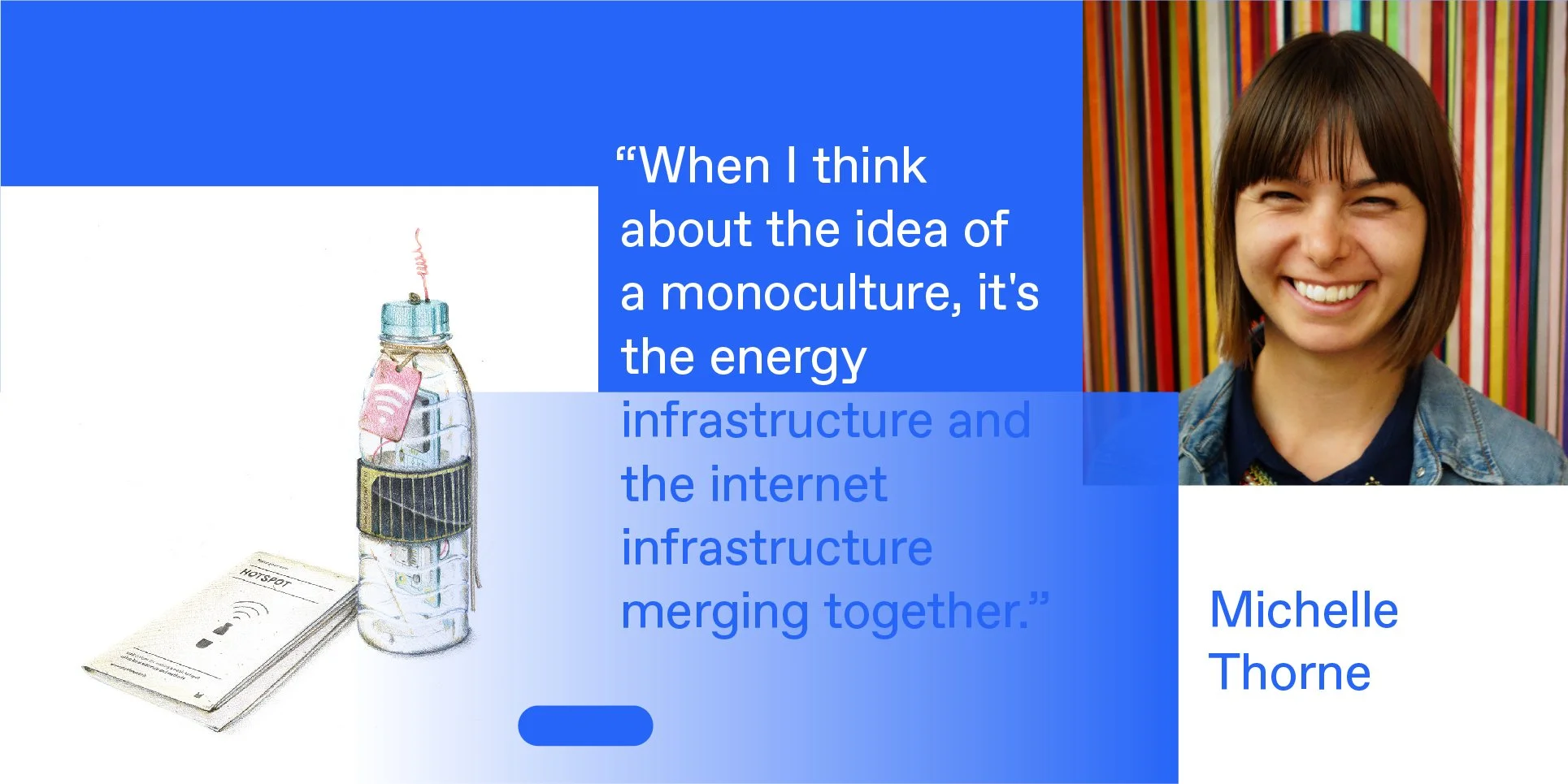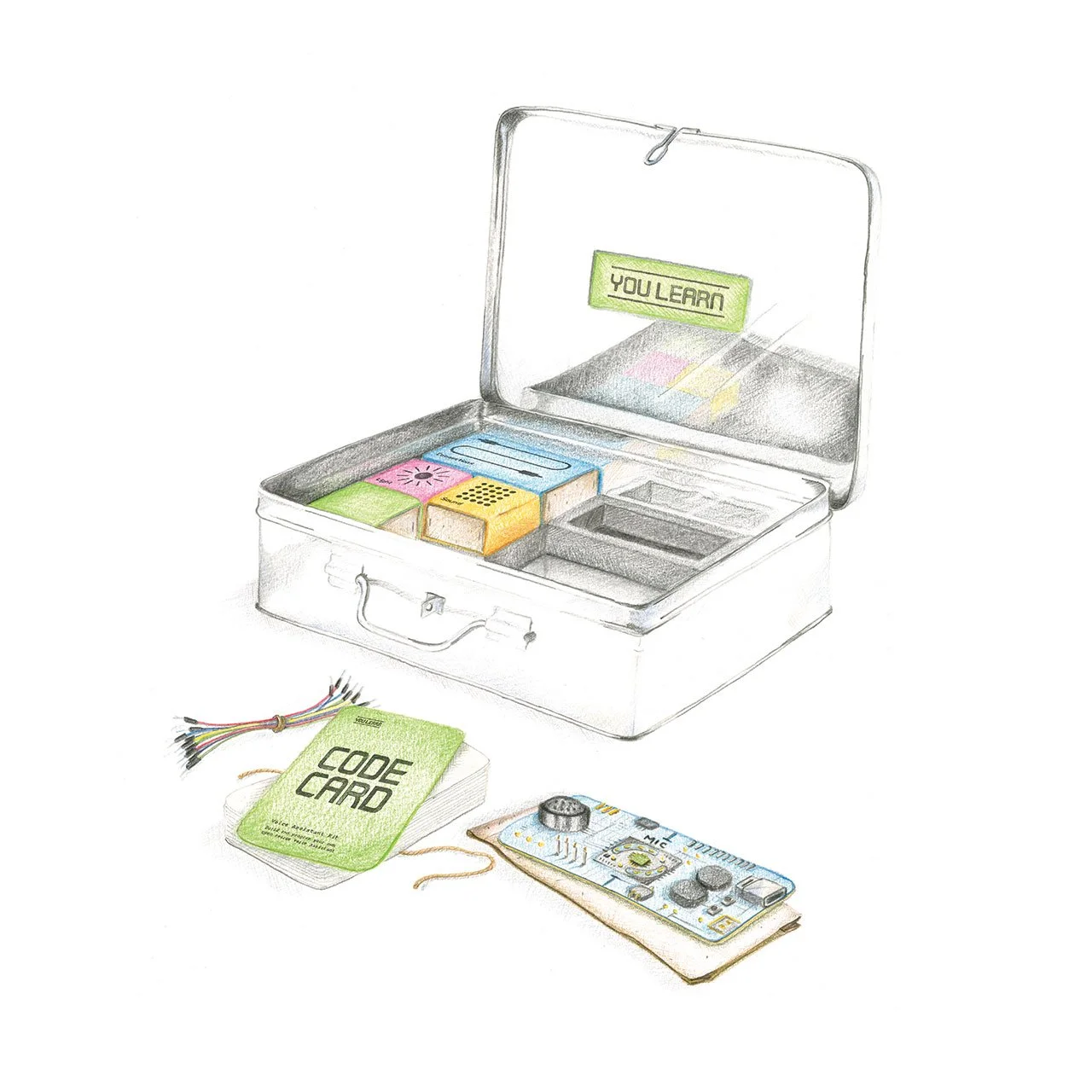Break the Digital Monoculture
INTERVIEW WITH MICHELLE THORNE
We need to break the digital monoculture and challenge Big Tech in their relentless drive to transform our digital environment in its own image. Digital Earth conducted interviews with artists, technologists and activists, who work towards building a pluriform and inclusive digital environment. Our main question: How can we break the digital monoculture and build a more humane digital future?
Decentralizing Digital, Children’s Coding Kit. Stainless steel case containing ‘Your Voice’ developers board, various electronic components, and a deck of coding cards. 2025.
Michelle Thorne (@thornet) is interested in climate justice and a fossil-free internet. As a Sustainable Internet Lead at the Mozilla Foundation, Michelle runs research initiatives in Mozilla’s Sustainability Program. She is also a Senior Advisor to the Green Web Foundation and editor of Branch Magazine.
Read more here.
First we would like to start with your background. How did you come to this work that you're doing now?
One of the main motivators for working on a fossil-free internet was spending more than a decade looking at free and open source culture and software. That's where my activist background was from. The Knowledge Commons and building alternatives to big tech was something I've been very interested in for a long time.
I worked at Creative Commons and I’ve worked at Mozilla for 10 years. For a long time, I've been kind of thinking and working on how we create more equitable access to the internet. How do we increase participation on the internet? How do we have people – full citizens – protected online. Around 2017-18, I realized that the planet is on fire. The internet is also creating emissions that are heating the planet. It was a moment of dissonance.
For the last few years, I've been trying to understand that dissonance and realized that there's actually a lot of people who feel that way; they are inspired by the possibility of technology to connect and empower, while also knowing that there's a dark side to it. That's been a motivator to ask what parts of the internet should be stewarded and cared for and advanced, while also ensuring that the internet is a tool to dismantle the power structures that delay climate action and reduce its own emissions.
What is the main question that drives you at the moment?
How do we achieve a fossil free internet by 2030? And how can we support technologists to bring climate justice more centrally to their work?
In light of the work you have done on digital rights and climate justice, how do you conceive of a digital monoculture?
I'm really glad that you also are thinking about this in terms of monoculture, too. I'm now working with Mozilla and with an organization called the Green Web Foundation. One of the things we discussed is the idea of moving the internet away from fossil fuels. However, if you just green the internet, you would still have this consolidated neoliberal monoculture. And so part of the transition that I see towards the Fossil Free Internet has to be one that's also supporting an open and diverse internet ecosystem.
Imagine that in 2030, a handful of companies are continuing to run the internet infrastructure. Yet, now they’re also increasingly running the energy infrastructure. For me this brings up the question of how we take the discourse we've seen in the digital rights sector around breaking up big tech to build alternatives and expand that to include a discourse around climate action.
One way I've been thinking about this is divesting from big tech. There are a lot of ways we can take resources from this monoculture and put it towards alternatives towards frontline communities and other places. I draw on several metaphors from ecology for thinking about internet ecosystems that go beyond the big five.
Decentralizing Digital, Mesh Hotspot & Instructions. Make Your Own Hotspot instructions by the Meshmaker organisation. 2025. Mesh Hotspot from Gulbarga Colony, Bangalore. Plastic Bottle, wound wire aerial, solar panel, various electronic components. 2038.
And how do you see that relation between ecology and the internet ecosystems?
The more that I learned about the internet's environmental impact, the more I realized how physical the internet is. We're told the story of the cloud, that ephemeral cloud, and you don't often think about the data centers and the mined material that went into the server. Understanding the physical aspects of the internet is hugely important, but not well understood, not even by technologists. It's abstracted, and technology is very good at abstracting.
You see the kind of consolidation of infrastructure that's not just internet infrastructure, but also energy infrastructure. There was a study out last year in the Financial Times, looking at who the major corporate buyers of green energy are right now. The top ones are tech companies. And so when I think about the idea of a monoculture, it's the energy infrastructure and the internet infrastructure merging together.
And the same companies controlling that infrastructure also have geographic concentration. They are headquartered primarily in the US. We just know that that kind of concentration isn't healthy.
And how do you wish to combine climate justice and digital rights?
There are a lot of angles. We’re seeing Google being able to become more efficient because they're controlling a whole internet stack. They're actually able to decarbonize their systems faster because of how extensive their control is. Through that, they get the benefit of being perceived as a green player. That just further solidifies their position. The ability to green your tech stack should be available to everyone, whether you're a small business, educational institution, or government. We should not have to rely on Google to have a green internet.
Another issue we're seeing is the digital security issues impacted climate activists. The more people are relying on Facebook to do their organizing, the more vulnerabilities they might have. There's also a need to create alternatives that improve digital security, so that when people take political action, they're also protected; their technology helps protect them without spying on them.
Are there any initiatives that you have encountered that provide possible ways to advance a sustainable internet?
We're making a magazine, Branch Magazine, which features kindred spirits who are building those alternatives. In short, we're trying to dream with people imagining what the sustainable internet looks like.
One of my favorites is Solar Protocol by Tega Brain, Alex Nathanson, and Benedetta Piantella.hey're talking about making internet infrastructures visible. They have a whole protocol around community stewards of servers, and these servers are powered by solar energy. It's starting a conversation or a provocation on how the internet relies on our physical environment as well as stewardship.
I also really like the work of Joana Moll. She is also trying to make these infrastructures visible. In The Hidden Life of an Amazon User (2019) she went to buy Jeff Bezos’ autobiography on Amazon. As she went through the purchasing process, she displayed all the code that was being put on her machine; all of the interfaces, all the tracking, etc. If you combined all of that code, it would make up something like 24 volumes of books. Moll illustrates that computation is basically outsourced to individuals, but it’s invisible to us and often not what we want.
There's also a lot of technologists doing good work on greening websites, especially with open projects like WordPress. These projects are a good entry point for technologists to then start thinking about bigger systemic issues. On Branch, we have tried to follow the Sustainable Web Design manifesto. One of the ideas that was really powerful is that you have two camps: people that don't want any data or only the bare minimum, and people that want more data and AI systems that will optimize the data. I think that there's some sort of third way—what if we build things that are more variable and that change depending on what the current ecological conditions are?
We tried to build this into Branch. Using an open source plugin, which you can add to any Wordpress site, determines what version of the website you see depending on the grid intensity of your current connection. For example, if I'm running on a lot of fossil fuels right now, then maybe it’ll show less data, but if it's running on renewables, maybe you can get like the full video. It’s a design for carbon awareness.
Decentralizing Digital, Mesh Bowl and Data Tokens. Mesh Bowl. Turned, oiled wood, various electronic components. 2045. Five Data Tokens. Turned, lacquered wood, various electronic components. 2045. Mesh Mat. Khadi Cotton with hand embroidered detail. 2045.
What would your recommendation be for individuals and civil society organizations that want to join this movement?
I mean, this is one of those not-so-satisfying answers. I do think there's a sense of commitment to transformation that you have to do, when you realize that we have big systems like the internet and planetary ecology. There are going to be a lot of things that we have to rethink and redo to be sustainable and avoid a brittle monoculture.
I think that part of this is like committing to learning. And then part of that is really learning from the environmental justice and the climate justice movement. Something I've noticed in the tech sector, there's a sense of amnesia in that we have to reinvent everything. Yet, there are existing social movements,and while they have their faults, we have to ask what we can learn from them?
There's ways we can make change in our daily practice and the organization of our sector. But also remembering that we're also citizens that have political power. Big Oil wants us to think it's all individual responsibility but actually, it's going to be collective action that's going to push back some of these really big systemic harms. So I think people realizing that there's small things they can do will help them gain confidence and awareness to then move towards collective transformative. Systemic change is where we need to be going.
What is the role of art and aesthetics in this for you?
Art really has that capacity to change the way we think, experience, and imagine. So I think that's one reason to love working with artists. Aesthetics is really important, because if we're talking about making transformative and systemic change, we're going to have to be not just saying no to something. We have to be saying yes to something else. We need help to imagine what that ‘yes’ is going towards. It might not be a piece of code or a text, but sometimes it's music or it'll be these other forms of understanding and experiencing.
Art helps us figure out the yes. That goes into the aesthetics of what's desirable, what's irresistible, and speaks to what we really want.
What is an example of an artwork that you find very inspiring and counters this digital monocultures?
There's an amazing set of researchers based in India that just released a project called Decentralizing Digital. They work with local farming communities and local indigenous tribes to ask what it would be like to have technology that's built with local materials, local traditions and crafts, and had things like voice assistance or personal AI's. They made all these different speculations that are much more situated in a history and a context, but also crafts possible futures. While that doesn't look directly out of fossil free internet, it looks at how we build with local resources and build for local communities, which is how we're going to combat the digital monoculture.
The drawings of artefacts that accompanied this interview are part of Decentralising Digital, an ongoing research project seeking to co-create new narratives for decentralised digital futures working with rural communities in Karnataka, India. The research is led by Quicksand, an interdisciplinary design research and innovation consultancy based in India, and in collaboration with local community partners, creatives from across the country and designers from the University of Dundee, UK. The team includes Loraine Clarke, Babitha George, Romit Raj, Jon Rogers, Neha Singh, Martin Skelly and Pete Thomas.



